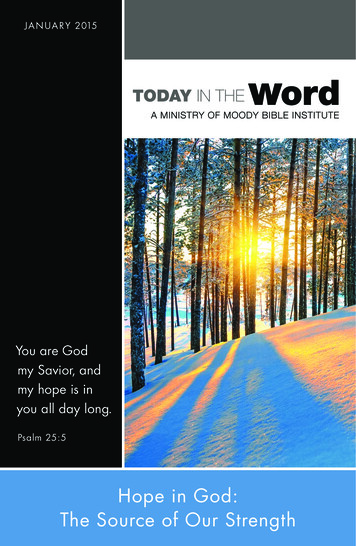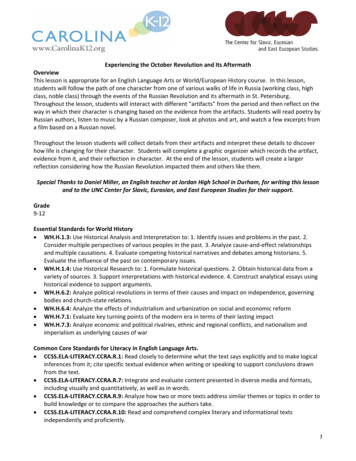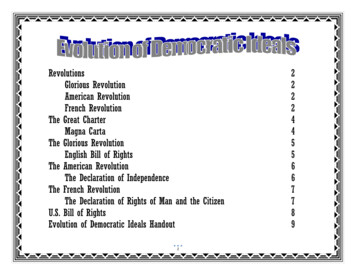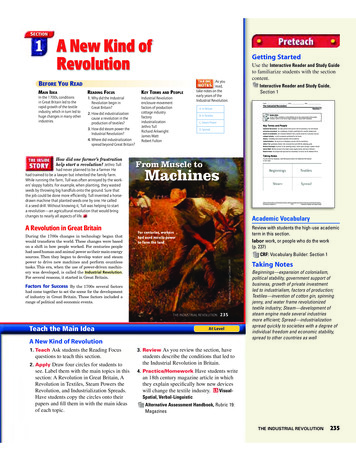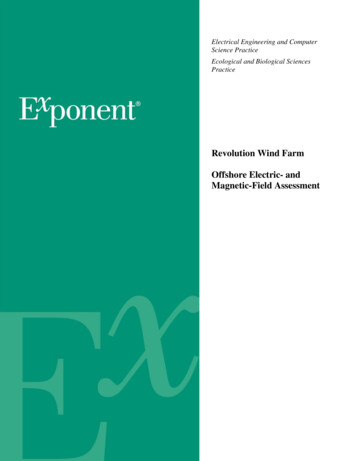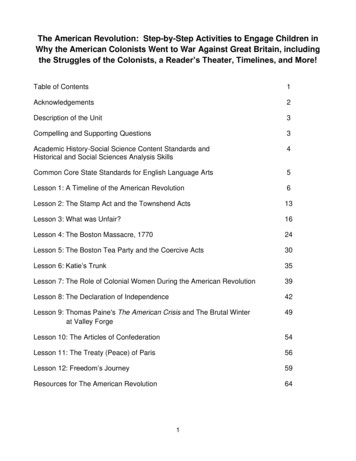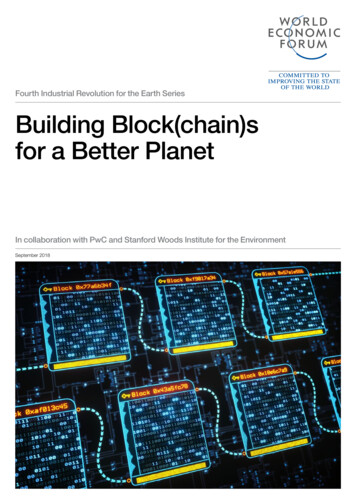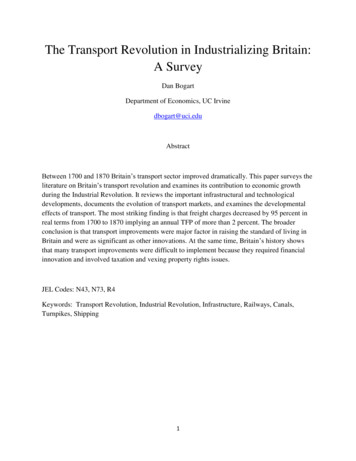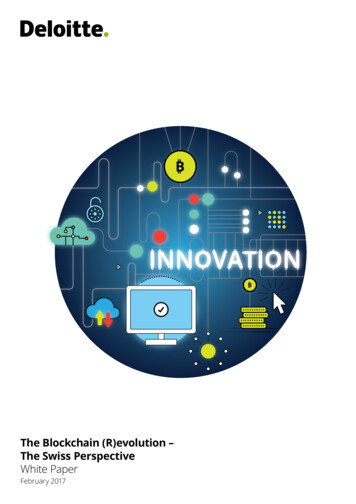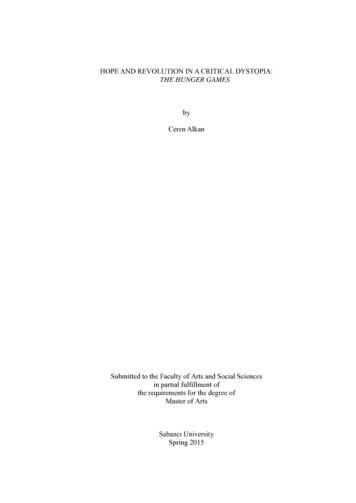
Transcription
HOPE AND REVOLUTION IN A CRITICAL DYSTOPIA:THE HUNGER GAMESbyCeren AlkanSubmitted to the Faculty of Arts and Social Sciencesin partial fulfillment ofthe requirements for the degree ofMaster of ArtsSabancı UniversitySpring 2015
Ceren Alkan 2015All Rights Reserved
HOPE AND REVOLUTION IN A CRITICAL DYSTOPIA:THE HUNGER GAMESCeren AlkanCultural Studies, M.A. Thesis, 2015Supervisor: Prof. Dr. Sibel IrzıkKeywords: Critical dystopia, hope, individualism, solidarity, revolutionThe Hunger Games, by Suzanne Collins, is a narrative embodying significantlydystopian elements such as an oppressive ruling regime, advanced technologies ofsurveillance, and constant threat on human life, which then transforms into a revolutionnarrative. This thesis presents an analysis of The Hunger Games in terms of notions ofhope and revolution, in comparison to classical examples of dystopian literature such asBrave New World and Nineteen Eighty-Four. First I look at the discussions on genrelimits within utopian literature as well as criticisms brought to utopian thinking ingeneral. Acknowledging hope as an ambivalent concept, I approach The Hunger Gamesbeyond the framework of currently introduced sub-genres of critical utopia and criticaldystopia. Using the means provided by the concepts of ―cruel optimism‖ and ―militantpessimism‖, I take hope as two different categories and emphasize hope‘s potential foroperating in favor of the existing system as well as being a revolution trigger. Usingcritical discourse analysis, I examine The Hunger Games and the revolutionary interestit embodies in relation to the transition of individual hope to collective hope, throughacts of solidarity. Finally, based on the critical approach that the trilogy presents forrevolution, in terms of devotion to a leader and use of violence, I examine how powermay take over utopian dreams.iv
ELEŞTİREL DİSTOPYADA UMUT VE DEVRİM:AÇLIK OYUNLARICeren AlkanKültürel Çalışmalar, Yüksek Lisans Tezi, 2015Tez Danışmanı: Prof. Dr. Sibel IrzıkAnahtar Sözcükler: Eleştirel distopya, umut, bireycilik, dayanışma, devrimSuzanne Collins‘in Açlık Oyunları üçlemesi, baskıcı bir rejim, gelişmiş izlemeteknolojileri ve insan hayatı üzerinde sürekli tehdit gibi belirli distopik unsurlarıbünyesinde barındıran bir anlatıdan devrim anlatısına evrilen bir metindir. Bu tez, AçlıkOyunları’nın umut ve devrim bağlamında, klasik distopya örnekleri olan Cesur YeniDünya ve Bin Dokuz Yüz Seksen Dört eserleri ile karşılaştırmalı bir analizinisunmaktadır. İlk olarak, ütopya edebiyatı içerisindeki janr limitlerine dair tartışmalarave ütopyacı düşünceye getirilen daha genel eleştirilere yer vermektedir. Umut, ikirciklibir kavram olarak ele alınmakta, Açlık Oyunları’na eleştirel ütopya ve eleştirel distopyagibi güncel alt janrlar tarafından belirlenen çerçevenin dışından bir yaklaşımbenimsenmektedir. Tez içerisinde, ―zalim iyimserlik‖ ve ―militan kötümserlik‖kavramlarını kullanılarak umut iki farklı kategori olarak ele alınmakta ve var olansistemin lehine işleyebilme ve devrimi tetikleyebilme potansiyellerine dikkatçekilmekte. Eleştirel söylem analizi ile Açlık Oyunları ve bünyesinde barındırdığıdevrim arzusu, bireyci umudun dayanışmacı eylemler aracılığıyla kolektif bir umudadönüşmesi bağlamında incelenmektedir. Son olarak da, üçlemenin devrime yönelttiğieleştirel yaklaşım temelinde, lidere olan adanmışlık ve şiddetin kullanımıbağlamlarında, gücün ütopyacı hayalleri nasıl ele geçirebileceğine vurgu yapılmaktadır.v
ACKNOWLEDGEMENTSBesides my own efforts, this thesis is also a product of the intellectual andemotional support of many others. Among those, first, I would like to thank my advisorSibel Irzık, who has enlightened my way and enriched my analysis with her preciouscomments. I would also like to thank my jury members, Ayşe Parla and BaşakDemirhan, for the motivation and inspiration they have provided. I am also thankful toThe Scientific and Research Council of Turkey (TÜBİTAK) for offering me ascholarship.İlkim Karakuş is the one to whom I would like to thank more in particular. Shehas been right next to me as a supportive academic company, an understanding bestfriend and a true non-kin sister. Her benevolence and warmheartedness has kept mestrong, even at times that strength seemed far away. Tuğçe Aysu is another friend towhom I would like to thank with all my heart. She has given me the joy of living when Ineeded the most, and I feel very lucky for having her in my life as a two-year flat-mateand a lifetime friend. I also would like to thank Pınar Budan for the solidarity she hasoffered me during the hardship of writing a thesis. Her soothing nature and friendshiphas made it easier for me to overcome any kind of crises.I would like to thank my family, knowing that it is not possible to thank them asmuch as they deserve. Everything I have accomplished, including this particular thesis,is at least half a product of their efforts. Thank you mom for taking care of me in waysthat I could not even think of, thank you dad for your trustful love. It is yourunconditional love that has first taught me that I should be caring for other people andnot only be considered with myself. And Yağmur, my dear little-sister, by introducingme The Hunger Games, you have a significant role in this piece. Thank you for being aloyal company during this process and thank you more for making me know that youwill continue to be one at each and every step of my life. I also would like to thank mygrandparents for being my first teachers. You are the ones who injected me with thecuriosity for learning, which took me to the path of academia. You filled my childhoodwith love and still continue to do so, I cannot thank you enough for that. Anotherspecial thanks goes to my aunt, Nihan Aksakallı, for being the most benevolent person Ihave ever known.Last, but not least, I would like to thank Sefa Üstün, my beloved partner. Ourdiscussions on hope constitute the first seeds of this thesis, and I am thankful not onlyfor your precious love and kindness, but also for the intellectual support you haveprovided.I would like to dedicate this thesis to people who continue to resist in a worldthat is day by day getting dystopian. It is you that keeps our utopian hopes alive, thankyou.vi
TABLE OF CONTENTSIntroduction.1Chapter 1: From Blueprint Utopia to Critical Dystopia.71.1. Political Significance of Utopian Literature.81.2. Changes in the Utopian Discourse and Emergence of Sub-genres.121.2.1. Dystopia and Anti-Utopia.131.2.2. Critical Utopia and Critical Dystopia.161.3. Conclusion.18Chapter 2: Mobilization of Hope in Dystopias – 1: Hope within the System.202.1. The Social, Economic and Political Structure of Panem.222.2. The Hunger Games and Rivalry.242.3. Cruel Optimism About Winning in the Games.252.4. Technologies of Control.26Chapter 3: Mobilization of Hope in Dystopias – 2: Revolutionary Hope.333.1. ―Yelling About the Capitol‖: Political Consciousness and its Expression.353.2. ―The Perfect Touch of Rebellion‖: Solidarity vs. Enforced Individualism.413.3. Revolutionary Hope and Militant Pessimism.473.4. Revolution, But How? : Critique of Power.49Conclusion.52References.55vii
INTRODUCTIONPresident Snow: Seneca, why do you think we havea winner?Seneca Crane: What do you mean?President Snow: I mean, why do we have a winner?I mean if we just wanted to intimidate the districtswhy not round up twenty-four at random, andexecute them all at one? It would be a lot faster.[Seneca Crane stays silent]President Snow: Hope.Seneca Crane: Hope?President Snow: Hope. It is the only thing strongerthan fear. A little hope is effective. A lot of hope isdangerous. Spark is fine, as long as it's contained.1The quotation above is from the movie The Hunger Games, film adaptation of thefirst book of the trilogy bearing the same title, by Suzanne Collins. The dialoguebetween President Snow (the president of the dystopic country Panem) and SenecaCrane (the game-maker of that year's Hunger Games), takes place right after KatnissEverdeen, the protagonist of the story and female tribute of District 12, is not punishedfor her daring act of shooting an arrow near Seneca Crane's head before the Games. Thepresident warns the game-maker, pointing out that Katniss' act is a sign of disobedienceand her getting away with it might give hope to others by showing them that it ispossible to act against the Capitol and remain unharmed. In the dialogue, Snow'sreference to ―hope‖ is noteworthy, since it raises a series of questions in terms of hopeand the ―danger‖ it may cause. What he means by defining hope as ―the only thingstronger than fear‖ or why he sees ―a little hope . effective‖, but ―a lot of hope .dangerous‖ are the questions that need to be asked for understanding how hope mightoperate in shaping people's behavior, both for or against the existing system. In thefollowing books of the trilogy, what Snow mentions as ―dangerous‖, comes into being1Although this thesis is about the books and not the movies, I think this quotation issignificant for understanding the sovereign‘s approach to hope in terms of itsadvantages and disadvantages for the status quo, and the representation of hope as amean of power, as well as its revolutionary potential.1
as a revolution. And, in the view of the end, mobilization and revolution become themain themes of the story which has started as a dystopian work. Being born as a resultof the curiosity for understanding what it means to have a revolution in a dystopiannarrative, this thesis seeks to present an analysis of representations of hope andrevolution in a dystopia, together with blurred limits of dystopia and enlargeddiscussion ground it provides.Dystopian narrative has mainly arisen in the twentieth century, as the inevitableproduct of a hundred years of pain and disasters (Moylan, 2000). Within the genre ofdystopia, a repressive government is not an exception, but one of the key elements.Dystopias appear generally as places where there is immense control over the subjectsand subjugation of individual agency. Domination of the society, and, the individualbody‘s total integration into the collective body through hegemonic discourses can alsobe listed as common features of dystopias. Questioning and resisting the system are rareattitudes among its citizens, and it is usually impossible for such attempts to succeed.Therefore, with a conventional approach, hope of change is not expected to be foundwithin a dystopia, but only outside it. When we look at the well-known examples ofdystopian literature, Brave New World (1932) by Huxley and Nineteen Eighty-Four(1949) by Orwell, they constitute a proof to that claim, due to the way that the systemoperates not allowing revolution to be actualized. In fact, even imagining a change doesnot seem possible within these societies, except for the rare cases of a few protagonistsand a couple of additional characters.Hope has usually been associated with utopian literature, since utopia describes abetter form of living, whereas dystopias are places that are oppressive and dark. Utopiaand dystopia were conventionally considered as opposites, and hope was excluded fromdystopia. However, current discussions on dystopia underline its difference from antiutopia, which is against utopianism by definition and approaches it either as dangerousor mere fantasy, and relocate dystopia somewhere relatively closer to utopia. Differingfrom anti-utopia, dystopia desires change in the existing social structure, but onlyexpresses that desire by using different means than the ones used in utopian writingsuch as, focusing on the problems of the present and the dangers of a possible future.In the light of criticisms brought to utopian literature, critical utopia and criticaldystopia have emerged as genre blending forms that challenge the binary oppositionbetween utopia and dystopia. Contrary to the assumed opposition between utopia anddystopia, these new narrative forms are close to one another (Moylan, 2000; Baccolini,2
2004). They have more open-ended structures compared to their conventionalcounterparts. To be more specific, critical utopias are more process oriented rather thanbeing blueprint ideals and have more open endings. And critical dystopias have emergedagain with more open ends, in which the individual or its agency is not subjugated in atotal sense and there is more room for hope in comparison to classical dystopias(Baccolini, 2004).Utopian and dystopian literature being the expression of social problems andfuturistic expectations, the society depicted within a dystopian novel, despite itsfictional character, cannot be considered independent from current politics. Although itcannot be taken as the ultimate representative of ―the social‖, the social criticism that adystopian novel provides constitutes a link between politics and literature. Petersen andJacobsen define dystopian imagination at the intersection of ―conventional socialscience, literary criticism and science fiction‖ (2012, p.108). Again, dystopia is animportant mean of social criticism due to the estranging ground it provides to itsreaders, because as Veena Das states, ―some realities need to be fictionalized beforethey can be apprehended‖ (2007, p.39). Because fictionalization leads to estrangement,which ―‗remove[s] the imprint of commonness that keeps events which can be sociallyinfluenced from getting changed today‘ (Kleines Organon fur Theater [Small Organonfor the Theater], paragraph 43)‖ (Bloch, 1988, p.226). On that account, Chapter 2 willfocus on discussions of political significance of utopian literature and criticisms broughtto it in accordance with changes in the social and political conjuncture. Then, movingfrom emergence of the sub-genres of dystopia, anti-utopia, to critical utopia and criticaldystopia, it will show evolution of the genre in terms of pushing its limits andsignificance of that evolution to the discussion ground provided by The Hunger Games.Despite the fact that the setting of The Hunger Games is not less oppressive than aclassical dystopia, it is different from classical dystopias in that it portrays peopleregaining their agencies and acting upon hope of change, or in this case hope ofrevolution. It should be stated that revolutionary hope does not exist since thebeginning. However hope is not entirely lacking in people‘s lives, either. Rather, beforeKatniss‘ entrance to the scene as provider of a different kind of hope, people, includingKatniss herself, were hoping for a better life, but in an individualist manner. It is whatPresident Snow refers to as ―a little hope‖, the one that works for the sustenance of thesystem rather than challenging it. This hope creates an optimism that keeps peoplewithin certain attachments that cause their destruction. Berlant (2011) calls it ―cruel3
optimism‖, and uses the concept to explain how people cannot let go of the attachmentsthat actually harm them. The optimism that tributes hold on to for becoming the victorof the Games can be evaluated in that category.In Brave New World and Nineteen Eighty-Four, the classical dystopias that Ichoose to take as points of reference, in order to present a more clear analysis of thechanges within the genre limits, hope is not used systematically for people‘smanipulation as it is in The Hunger Games. In Chapter 3, moving to discussions onhope, I focus on how individualism might function in shaping of hope, in such a waythat it would become one of the key elements used by the hegemon for manipulation ofits subjects by keeping them in the state of passivity. This chapter will look at the waysin which people of Panem are kept away from each other on purpose, and how enforcedindividualism keeps them within the state of cruel optimism and prevents them fromdeveloping class-consciousness or acting in cooperation for their collectiveemancipation. With the intention of presenting a comparative analysis, I will be lookingat representation of individualism in Brave New World and Nineteen Eighty-Four andhow false hope or lack of hope might work for the system‘s continuation in theseclassical dystopias.What makes The Hunger Games different from its classical counterparts is notonly the hope that keeps people within the system, but particularly the one that isrevolutionary, the form of hope that President Snow refers to as ―dangerous‖. WhenKatniss builds unexpected relationships with people who are supposed to be heradversaries, barriers that block off collective hope are tore down. Actually; already atthe time she volunteers to join the games in her sister‘s place and thus sacrifices herselfin devotion to her family, it can be told that she embodies the seeds of rebellion.Chapter 4 will seek to understand the dynamics of cooperation and solidarity thatovercome enforced individualism and lead to the transformation of individual hope intocollective hope. However it will also include how collective action might also besupplying more power to the authority, and challenge the dichotomic understanding ofhope that positions collective action as revolutionary regardless of its context. Inrelation that context dependency, it will also include criticisms directed to abuse ofpower in the name of revolution. In the second half of the story, revolutionaries getunder the command of the hierarchically organized and armed forces of District 13, andlose their grassroots character. Although depiction of Panem under the oppressive ruleof the Capitol is a critical one, the methods used for revolution are not embraced either.4
Most certain claim of The Hunger Games is for the significance of moving beyond theimposed framework. In the first half of the story, that claim corresponds to workingtowards formation of a different sociality by moving beyond enforced individualism,thus hope could be collectively formed to bring about social change. Whereas, in thesecond half of the story, it is about breaking the bonds of devotion to a leader andrecognition of the dangers that abuse of power may bring. Criticism directed to war andsystematic use of violence, even by revolutionary forces, is made clear by Katniss‘attitude towards President Coin, the commander of District 13. Through the positionKatniss takes, the concepts of revolution and leadership are questioned and dangers ofutopian promises are acknowledged. By withholding a happy-ending in theconventional sense, it is shown that use of violence can hardly bring an ultimate happyending, since its memories will not be erased. The Hunger Games does not give aprescription of a revolution or have claim of showing the ideal system. The most certainclaim about Collins‘ intention in writing the trilogy would be telling that she writesagainst hierarchy. In The Hunger Games the main critique is directed to centralizationand abuse of power. This is done by being critical either about the Capitol or District 13.In this regard, in Chapter 4, significance of questioning the means used for revolution,the dangers of devotion to a leader, and unquestioned use of violence will be discussedin detail in addition to revolutionary potential of cooperation and solidarity.Ghassan Hage (2003) conceptualizes society as a mechanism for the productionand distribution of hope. As a more current example of its genre, The Hunger Gamescarries more potential for discussions on hope and revolution, and therefore fordiscussions on society. It also articulates explicitly what have been subjects of socialsciences. Individual hope that is fed by the rivalry of the Games, covering up ofsolidarity by the mask of romantic love, hedonistic culture in the Capitol, use of mediaas a means of manipulation are all examples that could be given to what capitalism doesin a more subtle way. The change in people‘s subjectivities, overcoming enforcedindividualism, formation of collective hope and then coming face to face with devotionduring the route to revolution are just a simple list of the variety of points that TheHunger Games opens to discussion, and that make it a significant subject of analysis.Part of The Hunger Games’ significance lies at its genre blending character. Whatstarts as a classical dystopia gains a critical dystopian character by portraying howpeople regain their agencies and get involved in revolutionary attempts. Then it evolvesinto a critical utopian narrative, which turns its criticism to the means of revolution as5
well as dangers of devotion and leadership. Therefore, it is also possible to say that it isa text that is even blending the already blended limits of the genre. Having a structurethat challenges the conventional limits of the related genres provides The HungerGames the necessary ground for opening conflicting values and norms to discussion.Thus, just because it starts as a dystopian narrative, it does not continue as one and itsplot allows an end to the subjugation of individual agency. Likewise, just because itadopts a critical dystopian character, it is not limited to giving only bits of revolutionaryhope and staying away from showing the route it takes for a revolution. And last but notleast, just because it evolves into a story of a revolution it does not limit itself to thecelebration of revolution regardless of showing its potential problems such as devotionto a leader and the use of violence.6
CHAPTER 1FROM BLUEPRINT UTOPIA TO CRITICAL DYSTOPIAUtopia is a concept that is too broad to be considered only as a literary genre. Itbasically means the good place that is a non-place, and ―for most contemporary utopiantheory [it] is no longer a place but the spirit of hope itself, the essence of desire for abetter world‖ (Ashcroft, 2007, p.411). In addition to that conceptualization of utopia,utopianism is also defined as, ―expressions of desire for a better way of being‖ byLevitas (2010), ―process or moment of change‖ by Sargisson (2003), and ―socialdreaming‖ by Sargent (1994). Each of these definitions is significant for pointingdifferent aspects of utopia. The definition made by Levitas, defining utopia as desire fora better way of being marks the broadness of the concept since it might include severaldesires that are perceived as better by their holders. Whereas, defining it as a process, asSargisson does, is significant since it underlines that utopia is not a blueprint ideal, or adestination to be reached, but the route that we take towards the better. And the route,the process, is determinant in what would constitute that ―better‖. By defining it as aprocess rather than an unknown but idealized future, it allows the present‘s inclusion inutopia, and becomes more successful in calling people to action for making a change forthe better. Lastly, defining utopia as ―social dreaming‖ and subtracting the adjective―good/better‖ from its definition allows nightmares, i.e. dystopias to be perceived aspart of that collective dream. Such an inclusive approach paves the way to opening theassumed binary of utopia and dystopia to question. In that sense, each of thesedefinitions is similar to different points that Bloch makes in his definition of utopianism.Bloch (1986) broadens utopianism beyond the field of literature and includesevery vision of a better way of living in his definition. For him, utopianism is animpulse of desire for the better that can be transferred to a variety of things, and it is nota blueprint ideal but a process fed from the undecidedness of the ―not-yet‖ (ibid.). For7
him, hope is based on that ―not-yet‖ quality of utopia, since ―hope is not confidence.Hope is surrounded by dangers, and it is the consciousness of danger and at the sametime the determined negation of that which continually makes the opposite of thehoped-for object possible‖ (1988, p.16). Based on that description of hope, dystopiamight very well coexist with hope. However, it used to be considered as the opposite; asub-genre of utopia, from which hope is excluded. Looking at its origins, the reasons ofthat consideration are made clear.Dystopia is a much younger genre compared to utopia. It has born as a result ofloss of hope for a better future. Therefore, the setting of dystopia, which usually takesplace in the future, is dark and oppressive. Being direct products of their time and space,neither utopia nor dystopia can be thought abstracted from the social and politicalcontexts which they emerge from. Although that might look like a very general factabout literature per se, in case of utopian and dystopian writing the author‘s intention isalso based on building that relation with the social. Despite the opposition attributed tothese two genres, for understandable reasons, they have much in common to becategorized as genre opposites. They share the general calling of utopianism; whatSargent identifies as ―social dreaming‖, but they achieve it through different strategies(Moylan & Baccolini, 2003, p.5). The opposition is overcome by utopias written in the1960s, and they were followed by dystopias written in the same manner. These newforms of ―critical utopia‖ and ―critical dystopia‖ enlarged the genre limits withinutopian literature, and provided more complex representations of the social whichwould not coexist in either of the former binary categories. As an example to these newforms, The Hunger Games, starts as a post-apocalyptic dystopia where public criticismis included, and evolves into an attempt and realization of a revolution. The complexityof its plot enables it to approach notions of oppression and individualism, as well aspolitical consciousness, revolutionary hope and finally abuse of power in the same storyline.1.1.Political Significance of Utopian LiteratureUrsula K. Le Guin (2000) states in the preface to her book, The Left Hand ofDarkness, that science fiction writers are ―liars who tell the truth‖. Using metaphors or8
symbols, the (science) fiction writer presents her readers a world different than theirown, and the possibility of an outlook relatively freed from bias. By that definition sherefers to the power of estrangement and its significance for overcoming the ideologicalimpositions throughout the years spent living in this world. Being the key element ofutopian literature, estrangement provides a ―renewed perception‖ that makes us see theworld with a new perspective, ―it shows the world in sharp focus in order to bring outconditions that exist already but which, as a result of our dulled perception, we can nolonger see‖ (Varsam, 2003, p.206). Through literature, reality becomes a matter ofinterpretation, and ―[t]hrough the devices that ‗make strange‘ our perception of theworld, dystopian texts continually demand readerly attention to our relationship to thereal world,‖ to have us question our actions (ibid.). By reflecting on current events, butdoing it with the means of fiction and in a future setting, it gives today a historicalcharacter and opens it to discussion, more than it could by means of reality.In addition to estrangement, part of utopia‘s political significance lies in itsproposition for the possibility of an alternative to the existing system. The continuationof a system is dependent on its ability to reproduce the conditions of its production,including ideological conditions (Althusser, Balibar, & Bidet, 2014). And whatever thatsystem is, it has to be convincing about the impossibility of an alternative, since itscontinuation is based necessarily on that conviction. In other words, the stability of asystem is significantly related to how successful the hegemony operates in making thesubjects believe in lack of its alternatives. Thus, building their ideas in that ideologicalframe, members of a society would think that the best they can achieve is within thesystem and the only way they can have a better life is searching for it again within itslimits. This means, people will be assigning their hopes to the system, rather thanseeking a way out of it. Therefore, utopian genre is revolutionary regardless of itscontent, since it marks the possibility of a system that is both better and different thanthe one we already have. As Jameson states, ―The Utopian form itself is the answer tothe universal ideological conviction that no alternative is possible‖ (2005, p.232). Andthat is confirmed by Ahmed as the following; ―The Utopian form might not make thealternative possible, but it aims to make impossible the belief that there is no alternative‖(2010, p.163). In short, as the system convinces people to the impossibility of analternative, utopias try to do the opposite. They show different forms of socialorganization that are preferable to the current one and inject people with hope; theypropose alternatives so that we would not b
THE HUNGER GAMES Ceren Alkan Cultural Studies, M.A. Thesis, 2015 Supervisor: Prof. Dr. Sibel Irzık Keywords: Critical dystopia, hope, individualism, solidarity, revolution The Hunger Games, by Suzanne Collins, is a narrative embodying significantly dystopian elements such as an oppressive ruling regime, advanced technologies of
